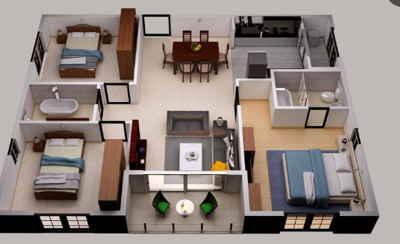
Choosing a house plan is an important step towards creating the space one will live in for years. A home is a self-contained extension of a person, with room for so much more to express taste, priorities, and passion. Choosing the right house plans involves careful consideration of a few key factors, ensuring the space complements your lifestyle.
Know Your Space Requirements
Figuring out space requirements to craft the best house plans requires assessing both current and future needs. Families may need more bedrooms or bigger communal areas, while singles might seek out a home office or studio space. You need not only to see how they will look; you must also have a mental picture of how all these rooms will work, feel, and function together.
Taking Your Lifestyle and Hobbies into Account
The house plan should take care of daily life. If you love to entertain, a layout that features airy, expansive dining and living spaces may be more up your alley. Others who put more of a premium on privacy might choose dedicated, separate spaces. Consider hobbies and interests—perhaps a home gym or room for a garden.
Assessing the Budget Limits
Financial aspects are a major part of the decision-making process. Creating a specific budget can help you filter out options and avoid overspending. Don't forget to factor in other costs —including landscaping, furniture, and upcoming maintenance. With realistic financial boundaries in place, homeowners can look for designs that strike a balance between quality and spending limitations.
Evaluating Future Growth Potential
Circumstances change, and so do housing needs. Sometimes, it can help to go for a house plan that allows for future growth. If you anticipate future needs (a growing family, aging parents, etc.), then the ability to add rooms or modify existing spaces will allow for longevity in the home. This foresight can save money on expensive renovations down the road.
Focusing on Daylight and Air Movement
The presence of natural light and ventilation has a direct effect on comfort and well-being. A design that maximizes windows and areas with open spaces can help lift a person's mood and energy. Adequate ventilation is also important for good indoor air quality, making a house healthier. These elements can also be optimized based on the home's orientation and opening placement.
Focusing on Energy Efficiency
As more people grow conscious of their ecological footprint, energy efficiency has moved to the top of the to-do list for countless homeowners. Selecting a sustainable house plan can help minimize utility expenses and carbon footprint. Sustainable features include things like solar panels, energy-efficient appliances, and even insulation, which play a huge part in sustainability. These aspects need to be considered from the beginning while designing.
Exploring Architectural Style Preferences
The aesthetic appeal of a home is largely dependent on its architectural style. Personal taste and style should also guide whether one is more attracted to modern minimalism, traditional warmth, or rustic cottage charm. Whatever flavor is chosen should reflect the neighbor and the person who happens to be walking through their yard, making it an inviting place with respect on both sides.
Professional Guidance
Weaving in professionals from the beginning ensures you have something to build upon. Experts such as architects, designers, and builders can help on the technical side, making sure that the chosen plan can be built and that it will remain within budget. Not only will their experience help you through complex decisions that you will need to face, but knowing that someone has been through it once peacefully can help ease your nerves in the process.
Selecting a good house plan is a matter of many variables that must be balanced and must all add up for satisfaction and admiration in the basic box that is a home. Understanding space requirements, the lifestyle with which one wants to match it, the available budget, and planned expansion in the family should help people make the right choices. Natural light, energy efficiency, and architectural style are some of the priorities that take it up a notch further. Working with industry professionals will provide additional support, ensuring that your home is catered to your individual needs and lifestyle.



(0) comments
We welcome your comments
Log In
Post a comment as Guest
Keep it Clean. Please avoid obscene, vulgar, lewd, racist or sexually-oriented language.
PLEASE TURN OFF YOUR CAPS LOCK.
Don't Threaten. Threats of harming another person will not be tolerated.
Be Truthful. Don't knowingly lie about anyone or anything.
Be Nice. No racism, sexism or any sort of -ism that is degrading to another person.
Be Proactive. Use the 'Report' link on each comment to let us know of abusive posts.
Share with Us. We'd love to hear eyewitness accounts, the history behind an article.